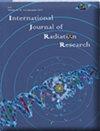(化学)放射治疗对非喉部头颈癌患者声音和生活质量的影响:主观和客观的评估
IF 0.4
4区 医学
Q4 RADIOLOGY, NUCLEAR MEDICINE & MEDICAL IMAGING
引用次数: 0
摘要
背景:波斯声障碍指数(VHI)在非喉部头颈癌(HNCs)化疗后影响患者声音和生活质量(QOL)的因素很重要。本研究旨在探讨伊朗非喉部HNCs患者(化疗)放疗后的发声问题,并利用波斯VHI评价影响患者发声生活质量的因素。材料与方法:对70例非喉部头颈癌(HNCs)患者行放射治疗,其中嗓音正常者80例。在治疗前、治疗期间和治疗后6个月分别用波斯语VHI问卷进行声学分析和自我评估。正常受试者被测试一次。声学参数和VHI问卷得分随时间的变化及其相关性通过统计分析进行评估。观察不同组患者嗓音及生活质量的影响因素。结果:除平均F0和问卷数据外,其他声学参数在治疗期间均显著恶化(P < 0.001),在最终评估时有所改善,但未恢复到初始水平。在治疗结束和治疗后6个月,VHI问卷的一些声学参数和亚组之间存在显著的关系。化疗、喉平均剂量和吸烟是影响患者生活质量的因素。结论:非喉肿瘤放疗剂量可引起喉损伤和声带问题。声学分析和波斯VHI问卷是评价患者嗓音和生活质量的两种有价值的方法。放射剂量、化疗和吸烟对声带问题的恶化有很大影响。本文章由计算机程序翻译,如有差异,请以英文原文为准。
The effects of (chemo) radiation therapy on the voice and quality of life in patients with non-laryngeal head and neck cancers: a subjective and objective assessment
Background : Factors affecting the patient’s voice and Quality of Life (QOL) by means of Persian Voice Handicap Index (VHI) are important in non - laryngeal Head and Neck Cancers (HNCs) following (chemo)radiation therapy. This study aimed to investigate the vocal problems caused by (chemo)radiation therapy among Iranian patients with non - laryngeal HNCs and to evaluate the factors affecting the patient’s voice QOL by means of Persian VHI. Material and Methods : Seventy patients with non - laryngeal Head and Neck Cancers (HNCs) were treated by radiation therapy, and eighty individuals with normal voice were considered. Acoustic analysis and self - assessment with the Persian VHI questionnaire were performed before, during, and 6 months after the treatment. Normal subjects were tested once. Changes in the acoustic parameters and VHI questionnaire scores over the time and their correlation was assessed using statistical analysis. The effect of important factors on the patient’s voice and QOL in different groups was investigated. Results : The results showed that the acoustic parameters except mean F0, and questionnaire data deteriorated significantly ( P < 0.001) during the treatment and improved at the final assessment, but not to the initial level. There was a significant relationship between some of the acoustic parameters and subgroups of the VHI questionnaire at the end and 6 months after treatment. Chemotherapy, mean laryngeal dose and smoking were factors that affecting the patient’s QOL. Conclusions : Radiation dose in non - laryngeal tumor in HNCs causes laryngeal damage and vocal problems. Acoustic analysis and Persian VHI questionnaire were two valuable methods in evaluating the patients’ voice and QOL. Radiation dose, chemotherapy and smoking greatly impact the aggravation of vocal problems.
求助全文
通过发布文献求助,成功后即可免费获取论文全文。
去求助
来源期刊

International Journal of Radiation Research
RADIOLOGY, NUCLEAR MEDICINE & MEDICAL IMAGING-
CiteScore
1.10
自引率
33.30%
发文量
42
期刊介绍:
International Journal of Radiation Research (IJRR) publishes original scientific research and clinical investigations related to radiation oncology, radiation biology, and Medical and health physics. The clinical studies submitted for publication include experimental studies of combined modality treatment, especially chemoradiotherapy approaches, and relevant innovations in hyperthermia, brachytherapy, high LET irradiation, nuclear medicine, dosimetry, tumor imaging, radiation treatment planning, radiosensitizers, and radioprotectors. All manuscripts must pass stringent peer-review and only papers that are rated of high scientific quality are accepted.
 求助内容:
求助内容: 应助结果提醒方式:
应助结果提醒方式:


